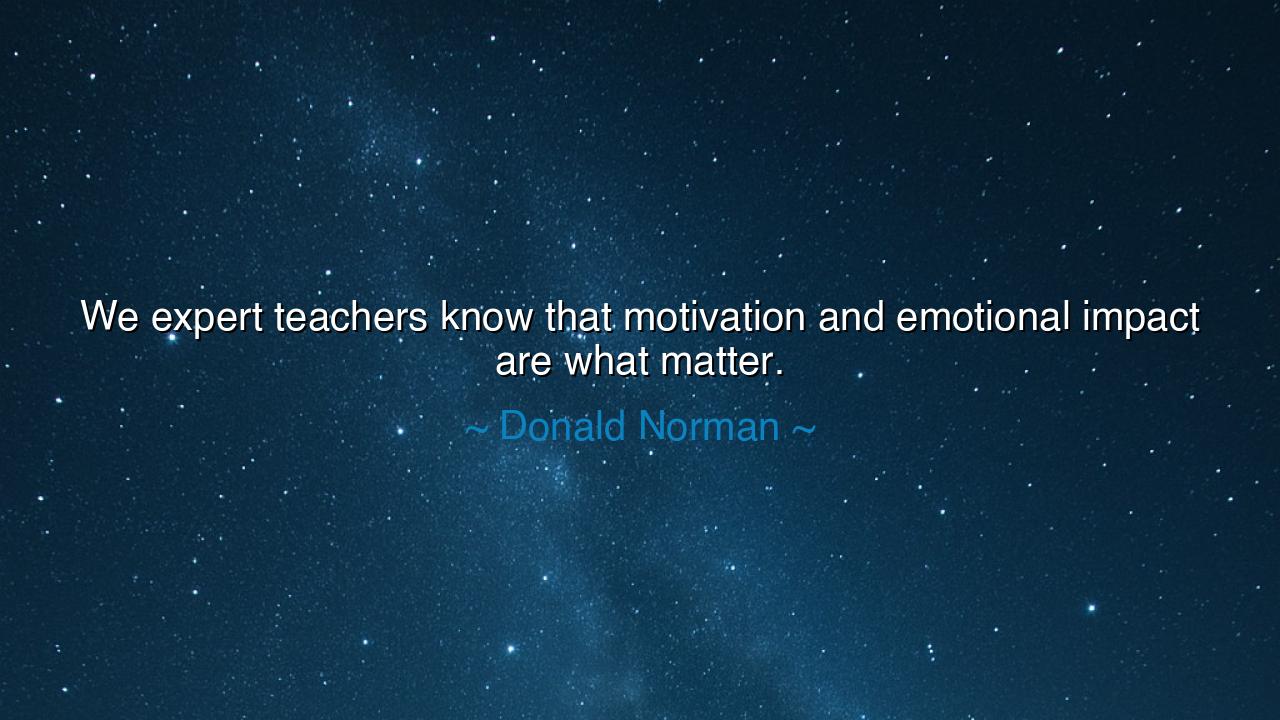
We expert teachers know that motivation and emotional impact are






Hear now the words of wisdom, wrapped in the mantle of ages. The sage Donald Norman declared: “We expert teachers know that motivation and emotional impact are what matter.” And truly, his saying is not born of idle thought, but of deep knowledge of the human heart. For teaching is not the mere delivery of cold facts, nor the stacking of lifeless stones of data. It is the breathing of fire into souls, the stirring of courage, the awakening of longing. Without motivation, knowledge lies as a sealed vessel; without emotion, the spirit does not drink.
The ancients knew this truth well. Consider the philosophers of Athens, who taught not with scrolls alone, but with passion in their voices and light in their eyes. Socrates questioned with zeal, his words burning into the hearts of the youth, for he knew that a truth merely told is soon forgotten, but a truth felt is never erased. Emotional impact carves memory into stone, while plain speech fades like dust upon the wind.
Look also to the story of Alexander the Great. His tutor was Aristotle, a man of immense wisdom. But what truly lit the fire in Alexander’s breast was not the geometry of lines nor the catalog of species—it was Aristotle’s ability to move the heart, to show that knowledge was the pathway to greatness, to glory, to shaping the world itself. Thus Alexander rode forth, not merely armed with facts, but inflamed with vision, a conqueror whose teacher gave him more than words: he gave him destiny.
And so, Norman’s words remind us: when a teacher speaks, the soul of the student must be stirred as a harp is struck by the musician’s hand. A dry lesson is a barren field, but when the heart is touched, the seed of learning takes root. Motivation is the rain, and emotion is the sunlight; together they cause the mind’s garden to bloom with knowledge, wisdom, and purpose.
We see this truth also in the struggles of history. Consider the soldiers of old, who trained under harsh masters. The best commanders were not those who barked commands alone, but those who inspired their warriors, who made them feel that their cause was noble and their efforts worthy. With emotional impact, a weary army will march another mile, a hesitant hand will grasp the sword, and knowledge will be lived rather than forgotten.
Let us not mistake, then, the role of the teacher. He is not a scribe, nor a lecturer of hollow sounds. He is a guide of hearts, a flame-bearer, one who awakens the sleeping power within another. For the mind learns, but it is the heart that remembers. To teach without stirring the soul is to speak into emptiness; but to weave learning with emotion is to plant immortality in the mind.
What lesson, then, must we take from these words? It is this: when you seek to teach, to guide, or even to persuade, never forget the human heart. Bind knowledge to feeling. Speak not only to the mind, but to the spirit. Show the beauty of the truth, not just its structure. In your family, in your work, in your friendships—do not speak to others as though they are machines of thought, but as living souls longing for fire.
Practical actions follow from this truth. If you are a teacher, begin each lesson with a story, for stories open the heart. If you are a leader, remind your people of the meaning in their toil, for meaning sustains when strength fails. If you are a parent or friend, encourage with warmth, for warmth kindles hope. And if you seek to learn, ignite within yourself a vision, a reason why, so that your path will not falter. For as Norman proclaimed, it is motivation and emotional impact—not the lifeless recitation of facts—that carry us forward into the light.






AAdministratorAdministrator
Welcome, honored guests. Please leave a comment, we will respond soon